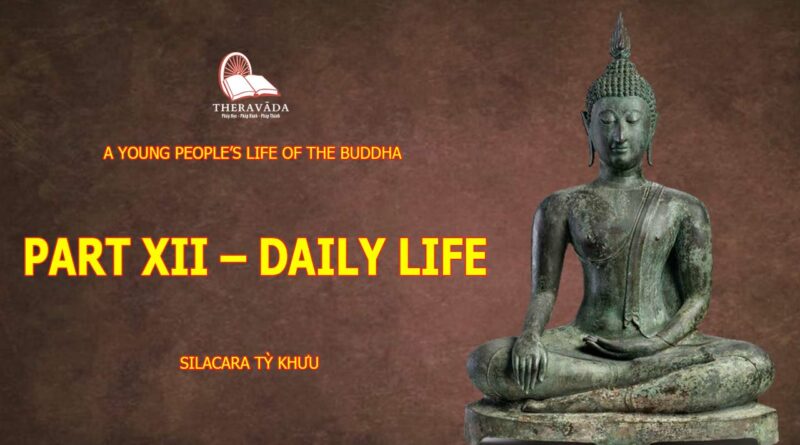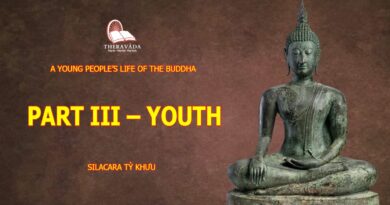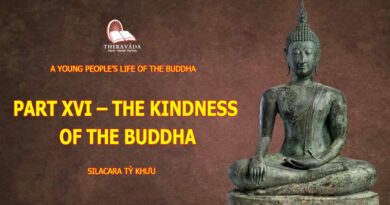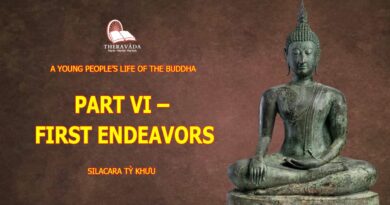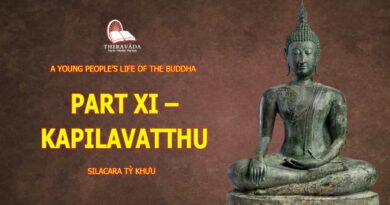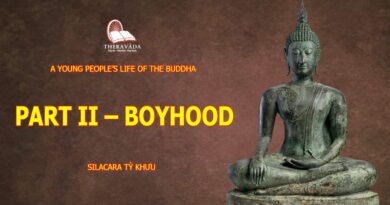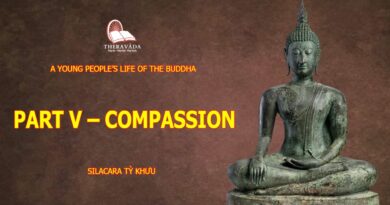A YOUNG PEOPLE’S LIFE OF THE BUDDHA: PART XII – DAILY LIFE
The Buddha now began that career of continual teaching and preaching which lasted for forty-four years, during which time He wandered about principally in that part of Northern India where are now Oudh, Bihar, and the North Bengal. Except during the rainy season He very seldom stayed more than a day or two at any one place. And during the rainy season of each year, He generally lived at the Bamboo Grove or Veluvana Vihara at Rajagaha that had been given Him by King Bimbisara, or else at the Jetavana Vihara near Savatthi in the Kosala country, which had been presented to Him by a very generous supporter of the Buddha and His Sangha whose name was Anathapindika.
During these years the daily habits of the Buddha were somewhat as follows:
He rose early in the morning before dawn, and after making His toilet, sat down and engaged in meditation for some time. Then, when daylight was fully come, He used to put His robe on decently over both shoulders, and taking His almsbowl in hand, go out to the village or town near which He happened to be staying at the time, and with His eyes fixed on the ground, pass from door to door, waiting for, and accepting in silence, whatever the charitable might put into His bowl. Sometimes He went out on this round for alms alone by Himself; sometimes he went accompanied by a body of His disciples who passed along in single file behind Him, their bowls in their hands also, and with the same modest and subdued demeanor. Occasionally, when begging alone, some supporter to whose door He came, would invite Him to come in and eat His meal in their house. Such invitations He usually accepted, taking the seat that had been prepared for Him, and partaking of what was put in His bowl by the people of the house who meantime had taken it from Him and filled it with the best of everything they had. Then, after finishing His meal and washing His hands, He would speak to those present about His doctrine, telling them about the benefit and advantage of doing good and the disadvantage and harm of doing evil both now and in the future, and then He would rise and go back to the place where He happened to be staying at the time. There He would sit quiet waiting in a rest-house or under a tree near by, until all the Bhikkhus living with Him at the time, had finished their meal also; and then He would retire to His own chamber where He would wash His feet, coming out again afterwards to give an address to the Bhikkhus who meanwhile had assembled together in order to listen to Him, and to exhort them to be diligent in learning the Doctrine and practicing the Discipline, so as to attain to a realization of Nibbana here and now in this present life.
After He had finished speaking, some of the Bhikkhus would ask Him to give them a subject to meditate upon suitable to their individual character and the state of progress at which they had arrived, and then the Buddha would tell them what would be best for them to meditate on that day, giving them an easy or a difficult subject according as they were beginners or far advanced in their study and practice. Then the Bhikkhus would break up their gathering, and each would go away by himself under a tree or to some retired spot in the fields, and spend the afternoon there meditating upon the subject the Master had given each for meditation.
The Buddha would now go back to His private room, and if it was the hot season, and by reason of the great heat He felt inclined to lie down for a little and rest, He would do so with His mind composed and collected. Then, being refreshed, He would rise from His couch which simply consisted of His robe folded in four and laid on the floor of His room, and He would begin to consider the people in the world and how best He could help them to gain final deliverance from everything evil. By this time the people from the village or town near which he was living, perhaps would come to Him with offerings of one kind or another, wishing at the same time to hear Him preach. So He would sit down and after accepting their gifts, speak to them in such a nice easy way, in a way so suited to the understanding of each person present, whether rich or poor, learned or unlearned, that each of them would think that the Great Teacher was speaking specially to them, to nobody else, and when He had ended speaking, they would all go away pleased and delighted with everything they had heard.
When these visitors had thus gone, the Buddha would then go and bathe in the Vihara somewhere or, if there was a good bathing-tank or pond near by, go and bathe there, and afterwards retire again to His private room, and sitting down alone, engage in meditation.
By this time it would be coming on towards evening; and now any Bhikkhus who did not belong to the company who were living with Him but were living somewhere else, were free to come and see Him and get advice from him about their practice of meditation or ask Him to explain to them some points about the Doctrine which they did not fully understand. Such Bhikkhus were now received by Him and He gave them the counsel and advice they required, and cleared up for them their difficulties in understanding with kind and helpful answers which sent them away cheered and encouraged and strengthened. And this the Buddha always did in the kindest and most patient and courteous manner. During all the forty-four years of His life when He thus received Bhikkhus from other places nearly every day, and answered their questions and solved their difficulties for them, never once was He known to lose patience with any questioner or become annoyed or angry at anything any one said, whether they were friendly or hostile; still less did He ever become confused and confounded, or unable to answer any question asked Him. He was always prepared to speak with all who came to Him, whether honestly ask His help, or only to try to trap Him in what He said. To those who really wanted help in their difficulties, He gave helpful, satisfying answers. And those who came to try to confuse and puzzle Him, and trip Him up in His words very often came away full of admiration for His ready knowledge and wisdom, some of them even becoming there and then His devoted followers for the rest of their life.
The evening and the earlier part of the night is this was given to visitors. But now, being a little weary of so much sitting all day, the Buddha used to get to His feet and spend some time just pacing up and down to relieve and refresh His limbs. Then, after walking back and forward like this for a while, He would retire to His room and go to rest for the night.
Thus during the forty-four years of His career of teaching and preaching His doctrine, did the Buddha spend each day when not actually engaged in traveling from one place to another, always ready to help and instruct any one who desired His help and instructions in religious matters. But it was not only in religious but also in every day worldly affairs that He was sometimes able to do good with His practical wisdom to the people among whom He freely moved during these forty-four years of active, beneficent life.
Thus, once when He was staying at the Jetavana Vihara at Savatthi, the people of Kapila and Koliya fell into a great and bitter dispute about the watering of their paddy fields. It was a time of drought. No rain had fallen for a long time, and as a result, the stream that ran between the fields of the Kapila folk on one side, and the fields of the Koliya people on the other, was almost dried up. There was only a very little water left in it. And each of these two peoples, the Kapilas and the Koliyas, wanted to get all the water there was for their own fields, and to leave the others none. And they began to get ready to fight about it, each party prepared to kill the people on the other side of the stream so as to get all the water in it for themselves.
Now the Kapila people were the Buddha’s own people, and when He heard about this quarrel of theirs with the Koliyas, He felt very sorry to think that they were going to kill other people and perhaps get killed themselves all for the sake of a little water. So He set out for the place where the angry people were gathered together all ready to fight, with their weapons in their hands. And when He got there He spoke to them like this:
“Princes and warriors, listen to what I am going to say, and answer what I ask you, truthfully. What is it you are getting ready to kill one another about?”
“About the water in the stream, here, which we both want for our dry fields,” said the people of both banks of the stream.
“Yes,” said the Buddha, “but tell me truly. Which do you think is the more valuable — the little water in this stream, or the blood in the veins of the many men, especially that in the veins of princes and kings?”
“The blood of men, and especially the blood of princes and kings,” the people at once replied, “of course is much more valuable than the water of the stream.”
“That being so,” the Buddha now said, “is it fit and proper to risk what is more precious and valuable for the sake of what is less precious and valuable?”
“Nay, indeed, Lord,” the people replied, “it would not be fit and proper to risk what is more valuable for the sake of what is less valuable.”
“If that is so,” concluded the Buddha, “go and conquer your anger, put away your murderous weapons, and come to a peaceable agreement among yourselves.”
And both the Kapila and the Koliya people, now heartily ashamed of their foolishness and lack of good sense thus pointed out to them by the Lord Buddha, did as He told them, and agreed to share equally between them what water was in the stream, and ever afterwards lived at peace with one another.
Source: Budsas.net

